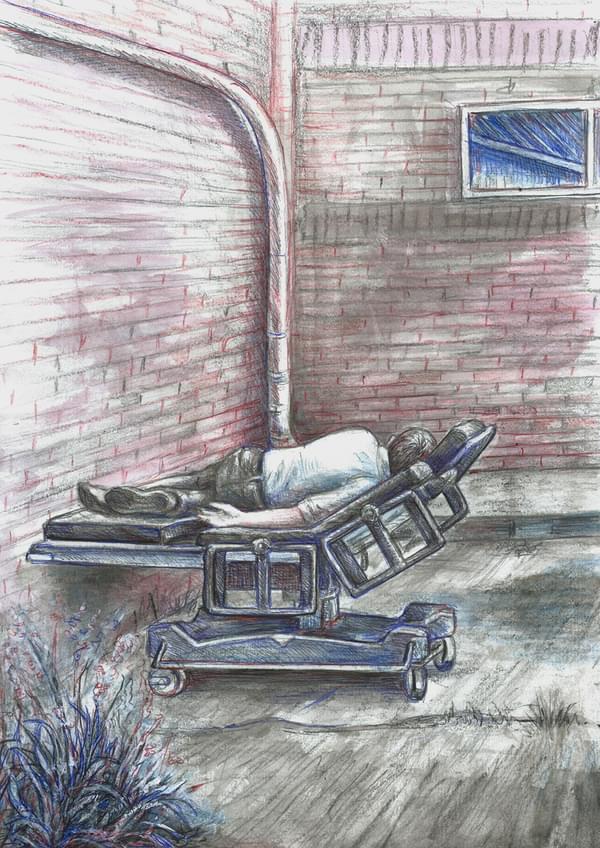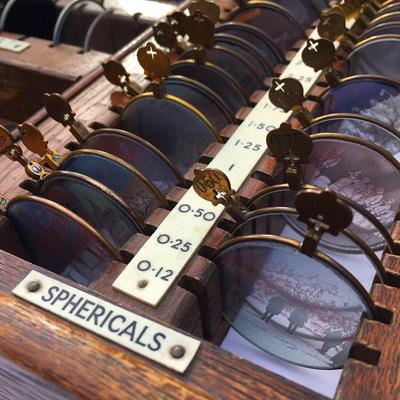"Recovery" Medical Doctor, Torbay Hospital.

This is one of series of co-created drawings that has been developed through continuing discussions and shadowing of staff at Torbay hospital to explore experiences of burn out and response to the word ‘wellbeing’. Staff are encouraged to talk about and visualise meaning and metaphor in their work and environment.
This work was produced as part of a residency with Torbay and South Devon Healthcare Trust 2022 -2025, funded by NHS Charities Together and will be part of a permanent exhibition in the historic boardroom at Torbay Hospital.
Medical Doctor
How does the drawing align with your own thoughts about working in the NHS? To me shows the lack of investment, but not just investment in resources, it’s investment in people. And it strikes me, looking at it, of fatigue and tiredness. And because it takes part in a space that’s unused or disused and unloved, so a kind of metaphor for the whole of the health service post pandemic.
If you could change one thing about the NHS, what would it be? Where to start? A change of ethos, to go back to valuing staff more. Because if the government doesn’t value the staff in the NHS, they pay lip service to it, then they can’t expect the public to value them either. And then they won’t value themselves and they will leave in droves.
Did you always want to work in healthcare? That’s a really interesting question because I am not sure I can think back that far. I am not sure that I understood what healthcare meant. I wanted to do something that would potentially impress my peers and my dad. And I thought being a doctor would cover both of those. And at 18 that seemed to be important and actually that was probably the wrong reason for coming into healthcare. It turns out it wasn’t the wrong thing for me to have done, but it took me 20 years to realise that. I always had a notion that if I felt I was doing a poor job I hoped I had the guts to leave. And always question that “Am I doing an ok job? Could I do better?” If I am doing a poor job, please leave.” I wouldn’t want to be looked after by me if that was the case ! (laughs). I think you have to reflect. And the other thing is not to suffer from hubris.
What has made your job worthwhile? The most important thing was feeling like I was making a difference, if not to lots of people, then to individuals. And doing this has put me in a very privileged position, hearing a lot of stories and meeting interesting people, hearing about their lives, in a way that I wouldn’t have done in any other profession. And that’s an honour and a privilege. So yes, I’ve been lucky and I think of myself as lucky.
How does the word ‘wellbeing’ sit with you? I think it fits in with wellness. For me, I’m not sure what wellbeing is. It encompasses so many different options, from feeling secure, from feeling loved, from feeling in good health, and all of these things change from day to day and moment to moment. So, I don’t know what wellbeing means exactly. It’s like saying what is health. It’s all relative. Does it mean happiness? Contentment? Coping? So no, I think it’s a coverall term which is used by managers to say that we’ve looked after people by exploring their wellbeing.
Any other thoughts about the drawing? I’ve always felt that a lot of attention is paid by institutions to the front of house, the entrance, which is possibly promising more than it can deliver. There’s always nice glass and chrome and artwork. And then the further back into the hospital you get, where the staff who are there 365 days a year for long careers are based. There’s lip service paid to making that environment a good place to work. And those spaces behind the building, the dumping grounds, are really a sign of a lack of care. It’s where the staff look out, it’s what they see when they look out of the window. They see equipment that’s been dumped, waste, weeds, cigarette butts and that is a bit sad.
Helping Artists Keep Going
Axis is an artist-led charity supporting contemporary visual artists with resources, connection, and visibility.



